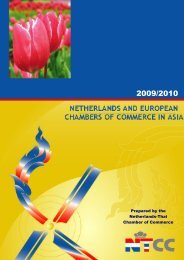December 2009 / January 2010 - Association of Dutch Businessmen
December 2009 / January 2010 - Association of Dutch Businessmen
December 2009 / January 2010 - Association of Dutch Businessmen
You also want an ePaper? Increase the reach of your titles
YUMPU automatically turns print PDFs into web optimized ePapers that Google loves.
Special<br />
Tibet, or did the 13 th<br />
Dalai Lama kowtow?<br />
By Willem Anne Hoekstra<br />
Kowtow: To kneel and touch the forehead to the<br />
ground in expression <strong>of</strong> deep respect, worship,<br />
or submission, as formerly done in China.<br />
My good father taught me that there are<br />
three subjects to avoid during conversations at<br />
the dinner table: Money, Politics and Women.<br />
How right he was. When I was having dinner with<br />
a Greek colleague in Athens many moons ago, I<br />
casually mentioned the case <strong>of</strong> Macedonia. This<br />
resulted in a 3-hour passionate lecture from<br />
his side on how unfair and wrong the claim <strong>of</strong><br />
independence <strong>of</strong> the Macedonians was, because<br />
in 14 th century... Similarly I was ignorant enough<br />
to mention something neutrally supportive <strong>of</strong><br />
the Palestinians to an Israeli friend <strong>of</strong> mine. A<br />
big mistake, it took months before we were on<br />
speaking terms again. Did I mention my friend<br />
in Northern Ireland yet? Maybe I am ‘een beetje<br />
dom’?<br />
Two years ago, I was on a business trip to our<br />
<strong>of</strong>fice in Shanghai, and I was silly enough to ask<br />
about the situation in Tibet. Me and my big <strong>Dutch</strong><br />
opinionated mouth. Wasn’t it that China invaded<br />
poor Tibet, and the Dalai Lama is the good guy who<br />
now tries to liberate the poor monks, right? Well,<br />
not quite, according to my Chinese colleagues.<br />
Soon I understood that Chinese students are<br />
taught that Tibet has been an “inalienable part<br />
<strong>of</strong> Chinese territory”, from the time <strong>of</strong> the Yuan<br />
Dynasty conquest onward. Now how did today’s<br />
dispute start? The essence <strong>of</strong> the conflicting claims<br />
<strong>of</strong> three parties <strong>of</strong> the sovereignty over Tibet can<br />
only be understood in the context <strong>of</strong> history, and<br />
more importantly, the interpretation <strong>of</strong> history.<br />
First a few facts. Tibet was first unified under<br />
King Songtsän Gampo in the 7 th century. Over the<br />
last centuries, a line <strong>of</strong> spiritual leaders called<br />
Dalai Lamas ruled as head <strong>of</strong> government, ruling in<br />
a close relationship with the Chinese Dynasties.<br />
In 1904, the British invaded the country,<br />
after Tibet had been closed to all foreigners for<br />
half a century. The British then agreed with the<br />
Chinese that the Qing would have sovereignty<br />
in return for a British fee and free trade with<br />
Tibet. Following this, the Qing government sent<br />
a military expedition <strong>of</strong> its own to establish direct<br />
Chinese rule and deposed the Dalai Lama in an<br />
imperial edict.<br />
In 1913, (after the fall <strong>of</strong> the Chinese<br />
Qing dynasty) the 13 th Dalai Lama proclaimed<br />
independence and expelled all Chinese<br />
representatives, an action never accepted by<br />
China, or by any other state. Tibet however de<br />
facto lived autonomous for the next 36 years,<br />
whilst the republic <strong>of</strong> China (ROC) endured its<br />
Warlord era, civil war, and World War II.<br />
The ROC was ruling mainland China between<br />
1912-1949, before it took refuge, and today de<br />
facto is based and governing Taiwan. It has kept<br />
its claim to legitimate sovereignty over China,<br />
including Tibet. Note that even during its factual<br />
government <strong>of</strong> China, it did never have real<br />
control over the region.<br />
The new People’s Republic <strong>of</strong> China PRC,<br />
which governs China since 1949, contends that<br />
according to the “Succession <strong>of</strong> States Theory”<br />
in international law, all subsequent Chinese<br />
governments (Ming Dynasty, Qing Dynasty, ROC<br />
and PRC) have succeeded the Yuan Dynasty<br />
in exercising de jure sovereignty and de facto<br />
power over Tibet.<br />
The Tibet government in exile, under<br />
leadership <strong>of</strong> the 14 th Dalai Lama, has a different<br />
reading <strong>of</strong> history. In their view, during the earlier<br />
dynasties, Tibet and China cooperated on the<br />
basis <strong>of</strong> ‘benefactor and priest’ relationship,<br />
perhaps comparable to the Vatican and Italy.<br />
The relationship did not imply “subordination<br />
<strong>of</strong> one to the other”. The 13 th Dalai Lama, for<br />
example, knelt, but did not kowtow, before the<br />
Empress Dowager and the young Emperor while<br />
he delivered his petition in Beijing. Chinese<br />
26<br />
Vol.19 • No. 10 • <strong>December</strong> <strong>2009</strong> / <strong>January</strong> <strong>2010</strong>
















